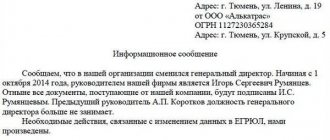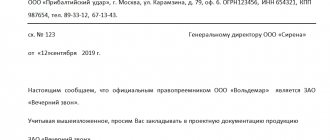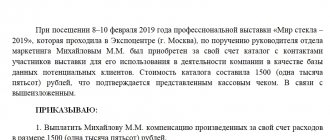Regulatory regulation of travel issues
The definition of the concept of “business trip” is given in Art. 166 of the Labor Code and reads as follows: this is a trip of a subordinate with a break from his permanent workplace to carry out an assignment given by management.
Travel by employees hired for traveling work is not considered as such.
The specifics of referral to it are contained in the government Decree of the same name No. 749 of October 13, 2008.
These acts regulate the issues of formalizing a business trip for the head of an organization, since he is also an employee, but authorized to represent the employer’s side in relations with other members of the team (relevant if the head is not the founder).
So, according to them:
- the duration of this trip is determined, depending on the volume of existing tasks and their complexity;
- the manager is provided with certain guarantees during his absence (in particular, about maintaining his position and average earnings, as well as about reimbursement of targeted expenses incurred upon his return).
- certain restrictions are established.
The length of stay on a business trip is not regulated. The only thing is that persons admitted to state secrets cannot stay in it for more than six months (Resolution No. 63 of 02/06/2010).
The legislation establishes the obligation to compensate the manager in full for targeted expenses incurred on a business trip.
Restrictions should be understood as a ban on business trips for the following categories of managers:
- women expecting a child;
- single parents who are dependent on minors under 5 years of age, disabled children or disabled household members.
Restrictions also apply to managers raising children under three years of age on their own. They can be sent on a business trip, but only with written consent and a medical certificate confirming good health.
An organization located in Brest sends its employee to a higher organization located in Minsk for an internship.
How are expenses incurred by an employee reimbursed?
To properly solve this problem, it is first necessary to determine the legal status of the internship.
If we are talking about internships for executives and specialists as a type of additional education for adults (Article 242 of the Education Code of the Republic of Belarus), then such legal relations are regulated by Art. 2201 of the Labor Code of the Republic of Belarus (hereinafter referred to as the Labor Code) with the provision of guarantees in accordance with the Regulations on guarantees to employees sent by the employer for professional training, retraining, advanced training and internship, approved by Resolution of the Council of Ministers of the Republic of Belarus dated January 24, 2008 No. 101.
Such an internship assignment is not a business trip based on the definition contained in Art. 91 of the Labor Code (a business trip is recognized as a trip by an employee, by order of the employer, for a certain period of time to another location to perform an official assignment outside the place of his permanent work).
If we are talking about a certain stage in the professional activity of an employee (for example, an internship on labor protection issues preceding appointment to a position), then in such a situation there is a business trip with the provision of guarantees in accordance with Instruction No. 35* | *| . __________________________ * Instructions on the procedure and amount of reimbursement of expenses during business trips within the Republic of Belarus, approved by Resolution of the Ministry of Finance of the Republic of Belarus dated April 12, 2000 No. 35 (hereinafter referred to as Instruction No. 35).
* The issue of payment to a member of the board of directors in connection with participation in a meeting of shareholders of compensation for travel and accommodation expenses outside the place of residence and its taxation
For reference: issues of conducting internships for workers and specialists in organizations by employees of these organizations are regulated by:
– Instructions on the procedure for training, internship, instruction and testing the knowledge of workers on labor protection issues, approved by Resolution of the Ministry of Labor of the Republic of Belarus dated November 28, 2008 No. 175;
– Instructions on the procedure for conducting internships for drivers of motor vehicles, approved by Resolution of the Ministry of Transport of the Republic of Belarus dated October 23, 2012 No. 46;
– Instructions on the procedure for conducting internships for employees of public railway transport organizations, approved by Resolution of the Ministry of Transport of the Republic of Belarus dated June 30, 2015 No. 26, etc.
Is it necessary to issue a travel certificate to an employee?
It is necessary if it is provided for by a local act.
The need to issue a travel certificate to employees when they are sent on a business trip is determined by the employer (Article 95 of the Labor Code).
Thus, if we are talking about a business trip, the employee is issued a travel certificate, if this is provided for by the local regulatory legal acts of the organization.
Is the cost of travel reimbursed if, if there is a direct transport connection with the city where the employee is sent, he presents a travel document for public transport with departure not from the place of permanent work (for example, he was sent on business from Minsk to Brest, but presented a ticket for a train with departure from Baranovichi)?
Reimbursable – taking into account the norms sub. 4.1 clause 4 of Instruction No. 35.
As a general rule, expenses for travel by public transport (except taxis) to the place of business travel and back to the place of permanent work are reimbursed (subclause 4.1, clause 4 of Instruction No. 35).
At the same time, having a ticket |*| departing from a place other than your permanent place of work does not always mean that the trip is not related to a business trip. For example, in the situation under consideration, the city of Baranovichi is located on the route to Brest from Minsk. That is, the employee could end up in Baranovichi for objective reasons, having left Minsk on a personal vehicle, passing by official transport, or in another way, which does not contradict the purposes of the official business trip.
* The question of whether an electronic ticket is a document confirming travel expenses incurred by an employee for the purpose of exemption from income tax
Instruction No. 35 does not separately regulate the procedure for reimbursement of travel expenses in the event of an employee traveling to the place of a business trip and back by different types of transport (or one type of transport with a transfer). At the same time, according to sub. 4.1 clause 4 of Instruction No. 35, travel expenses are reimbursed both on the basis of original travel documents and without presenting them (at the minimum cost of travel).
Thus, if the trip in question is related to a business trip, then the expenses are reimbursed in the minimum cost of travel on the route Minsk - Baranovichi (based on the recommended distances for transporting passengers and cargo between populated areas of the Republic of Belarus and the tariff for 1 km of travel when transporting passengers by trains on regional economy class lines established in accordance with the law) and in the amount of the fare according to the ticket on the route Baranovichi - Brest.
Attention! If the employee arrived in Baranovichi on the organization’s vehicle, then travel expenses are not reimbursed (part five, sub-clause 4.1, clause 4 of Instruction No. 35).
In such a situation, it would not be superfluous to obtain explanations from the employee about the reasons for choosing such a route to the place of business trip and attach them to the advance report.
The employee is sent for 5 days to another area, located at a short distance from his place of permanent work. At the same time, transport links allow you to return to your place of residence every day. At the same time, upon returning from a business trip, the employee presented an invoice from the hotel for accommodation during the entire period of the business trip.
Would it be a violation to reimburse living expenses in such a situation?
Reimbursement of living expenses depends on the content of the travel order.
When sending an employee to another area located at a short distance from the place of permanent work, the employer decides the question of whether the employee can return daily from the place of business trip to his place of residence (place of stay), taking into account the distance, transport conditions, and the nature of the task being performed. , as well as the need to create conditions for the employee to rest and stipulates in the order (instruction) on the secondment of the employee (clause 3 of Instruction No. 35).
It follows from this that the procedure for reimbursement of travel expenses depends on the content of the order (instruction) on the business trip. If the employee is not required to return to his place of residence every day, then living expenses are reimbursed in the manner provided for in subsection. 4.2 clause 4 of Instruction No. 35.
For reference: expenses for renting residential premises (except for travel time) are reimbursed:
- according to actual expenses, but not higher than the cost of a single room (one bed in rooms with 2 or more beds, and with the permission of the tenant - in rooms of the highest category);
– on the basis of original documents confirming these expenses, issued in accordance with the legislation of the Republic of Belarus when providing services and paying for them (subclause 4.2 clause 4 of Instruction No. 35) |*|.
* Information on how to confirm expenses for travel on a business trip by minibus
An employee is sent to another city to participate in a seminar for 1 day (Monday). Upon returning from a business trip, he presented travel tickets (travel to the place of business on Sunday, return on Monday) and an invoice for 1 night of hotel accommodation (from Sunday to Monday), citing the fact that objectively, taking into account the conditions of transport communication, it was impossible to make it in time to the beginning of the seminar, leaving on a business trip on Monday.
How are travel expenses reimbursed in this situation?
Based on the contents of the travel order.
The day of departure on a business trip is the day of departure (departure) of a train, plane, bus or other vehicle from the place of permanent work of the business traveler, and the day of arrival is the day of the specified transport’s arrival at the place of permanent work. When transport departs before 24:00 inclusive, the day of departure is considered the current day, and from 0:00 and later – the next day (Article 93 of the Labor Code).
It follows from this that the manager’s order provides for departure on a business trip on Monday, and Sunday is not included in the period of the business trip.
If a posted employee uses for personal purposes public holidays, holidays and weekends established in accordance with the law, at the place of the business trip before or after its end, the employee’s travel is paid on a general basis, and daily allowances and expenses for renting living quarters for these days are not reimbursed (clause 6 of Instruction No. 35).
Consequently, in the situation under consideration, travel expenses are reimbursed at the cost indicated in the travel tickets, and daily allowances are reimbursed according to the norms of a one-day business trip for Monday.
At the same time, in order to avoid conflict situations in such cases, it is advisable to work out the issues of the procedure for staying on business trips in advance.
In the above situation, if there is proper justification (for example, in a memo preceding the issuance of the order), the employer has the right to second the employee for 2 days (Sunday and Monday). In such a situation, accommodation expenses should be additionally reimbursed, and daily allowances should be paid for 2 days of a business trip.
Upon arrival from a business trip, the employee, as documents confirming living expenses, presented a rental agreement for residential premises concluded with an individual entrepreneur, and a receipt from this entrepreneur for receipt of cash under the agreement.
Is the employee reimbursed for expenses incurred based on these documents?
Not refundable.
Expenses for hiring residential premises (except for travel time) are reimbursed to the posted worker based on actual expenses on the basis of original documents confirming these expenses, issued in accordance with the legislation of the Republic of Belarus when providing services and paying for them (subclause 4.2, clause 4 of the Instructions No. 35).
The procedure for accepting cash is regulated by paragraphs. 17 and 32 of Regulation No. 924/16*. __________________________ * Regulations on the procedure for using cash register equipment, payment terminals, automatic electronic devices, vending machines and accepting cash, bank payment cards when selling goods, performing work, providing services, carrying out activities in the field of gambling, lottery activities, conducting electronic interactive games, approved by Resolution of the Council of Ministers and the National Bank of the Republic of Belarus dated July 6, 2011 No. 924/16.
When accepting cash, an individual entrepreneur is required to provide the employer with a confirming document:
– when using cash register equipment – cash receipt;
– without using cash register equipment – a receipt for accepting cash.
For reference: the form of the receipt is determined by Decree of the Ministry of Trade of the Republic of Belarus dated August 23, 2011 No. 34.
In addition to the specified receipt, when accepting cash, an organization can use a cash receipt order, taking into account the rules determined by letter of the Ministry of Taxation of the Republic of Belarus dated December 19, 2017 No. 8-2-11/02328 “On the procedure for accepting cash.”
As we can see, in the situation under consideration, a receipt does not apply to documents issued to confirm the acceptance of cash in accordance with the law. Consequently, there are no grounds for reimbursement of expenses incurred in full. In this case, expenses can be reimbursed at the rate provided for reimbursement of expenses for renting residential premises without submitting original documents.
Thus, in order to prevent the emergence of conflict situations when reimbursing travel expenses, it is advisable to pre-consult employees about what documents they need to request, incl. when renting residential premises.
From the editor:
Currently, the following amounts for reimbursement of expenses for business trips within the Republic of Belarus are in effect:
– for accommodation outside the place of residence (stay) to cover additional expenses – daily allowance – 7 rubles. per day;
- for accommodation outside the place of residence (stay) to cover additional expenses - daily allowance for one-day business trips and business trips to another area located at a short distance from the place of permanent work, from which the employee returns daily to the place of residence (stay) - 3 rubles . 50 kopecks per day;
– without submitting original documents confirming payment of expenses for renting residential premises – 2 rubles. 50 kopecks per day (clause 1 of the resolution of the Ministry of Finance of the Republic of Belarus dated June 16, 2016 No. 48).
For citizens temporarily assigned or seconded to work in the territory of radioactive contamination in the evacuation (exclusion) zone, an increase in the amount of daily allowance established by the Ministry of Finance for business trips within the Republic of Belarus is provided for by 5% (subclause 1.2 clause 1 of the resolution of the Council of Ministers of the Republic of Belarus dated July 10, 2009 No. 918).
Features of reimbursement of travel expenses when sending sports delegations to participate in events held in accordance with regulatory documents adopted by international and other foreign organizations are contained in clause 12 of the Regulations on the procedure for forming and sending sports delegations of the Republic of Belarus abroad to participate in sports events events approved by Resolution of the Council of Ministers of the Republic of Belarus dated September 19, 2014 No. 901.
Registration of a director's business trip: documents
The business trip is accompanied by documents adopted by Decree of the State Statistics Committee No. 1 from 01/05/2004 to 2013.
Before proceeding with their registration, you should study the statutory documentation. It indicates the person authorized to draw up and endorse local orders. Sometimes this is a deputy manager or chief accountant, which is allowed by clause 3 of Art. 53 Civil Code. If the director himself is the director, then he must sign the required papers.
Next, a package of documents is generated in the following sequence:
- f. No. T-10a;
- f. No. T-9;
- order on temporary replacement of the manager;
- f. No. T-10.
The first form is an official assignment for sending on a business trip and a report on its implementation. It briefly summarizes the results of the trip and the expenses incurred.
On its basis, a secondment order is issued (clause 2) and, in parallel, an order to replace the manager.
The fact of being on a business trip and its duration is proven by a travel certificate (clause 4), issued in one copy when traveling within the Russian Federation for a period exceeding one day. It contains the personal data of the traveler, the purpose of the trip, time stamps of arrival at the destination and return, and is provided by the manager to the accounting service along with the advance report.
All of the above is signed by the head of the organization, unless the right to do so is delegated to another person. That is, he sends himself on business.
Since the beginning of 2020, the documents from paragraphs 1 and 4 are considered optional (Resolution No. 1595 of December 29, 2014), however, in many domestic companies they still exist.
Delegate authority correctly
When issuing an order to send a director on a business trip, it is important to pay special attention to the delegation of responsibilities. Usually the powers are transferred to the deputy, but it is also possible to another employee.
The main thing is to issue the appropriate Order.
See the figure for an example:
Order on transfer of powers
Replacing a director without being released from the main job requires additional payment.
If it is planned to transfer some functions, all of them are specifically prescribed in the Order. Otherwise, the deputy will have to perform all the functions specified in the Charter.
Another document that needs to be drawn up during the manager’s absence is a power of attorney.
It also contains the powers that will be vested in the deputy. The validity period is no more than three years.
The completed sample is shown in the figure:
Example of a power of attorney
Order to send the director on a business trip
Since 2020, the order is the main basis for processing business trips and compensation for expenses incurred during them.
The issue of the number of copies of a document has not been considered at the federal level, so managers decide it on their own, taking into account the needs of office work. Most often, one original is published, a copy of which is sent to the accounting service.
The header contains information about the company name, OKPO code and document numbering.
The body of the order states:
- duration of the trip (in cal. days);
- dates of departure and return;
- destination;
- purpose of the trip;
- personal information of the manager;
If necessary, the party financing the trip is mentioned.
The document must be endorsed by the manager (or an authorized person) and certified with a seal. Instead of signing the acquaintance, you can put a date.
The order is archived:
- 5 years – if the trip was short-term, that is, did not exceed a year (or 6 months, as mentioned above);
- 75 years old – in case of long-term business trip.
Payments and reimbursements
Any employee, including the head of the enterprise, is entitled to the following payments:
- travel allowances – payment of funds for all days spent on a business trip;
- average daily earnings during absence from work due to a business trip;
- daily allowance, which is the amount paid daily for accommodation;
- reimbursement of personal expenses, if any, during the business trip.
Food and accommodation
Food and accommodation on a business trip is one of the most important issues, so it is so important to take care of it in advance.
As a rule, food and accommodation for a business traveler, including management, is provided on a daily basis, which will be discussed below.
It is believed that daily allowances are issued so that a posted worker can afford decent food and accommodation on a business trip, while, as practice shows, the cost of food outside the permanent place of work increases significantly and therefore daily allowances should be at a good level.
This is interesting: Brief description of the student based on the results of the internship
Also, to confirm the cost of services provided, in particular hotels and meals there, you must ask for a receipt, and also collect all receipts to attach them to the trip report.
As practice shows, additional costs incurred are paid by the organization quite quickly if there is strong evidence.
Daily allowance
According to the law, daily allowances are payments of funds to a business traveler before going on a trip so that he has the opportunity to fulfill any personal needs of the body.
In this case, daily allowances are paid for all days spent on a business trip, including holidays and weekends.
By personal car
A business trip in a personal car also requires reimbursement of expenses incurred by the employee.
In order for the organization to be able to reimburse the spent funds to the business traveler, he must provide:
- documents indicating a job assignment or purpose;
- receipts from gas stations, hotels and food places;
- other documentary evidence of expenses incurred.
Very often, for the use of a personal car for the purpose of operating an enterprise, an employee is paid a fixed amount of compensation, thanks to which he will be able, if necessary, to repair the vehicle or maintain it in good condition. These actions are fixed in an agreement between the business traveler and the legal entity.
The same actions apply to the head of the enterprise. An agreement is concluded according to which a certain amount of money will be paid to him for the use of a personal car for the development of the enterprise, in particular for business trips.
The transfer of powers by the manager - how it is carried out, how it is supported
When sending a manager, attention should be paid to the issue of delegating his responsibilities. They can be transferred to any employee, but with his written consent. If it is given, a corresponding order is issued.
In the sample document:
- the duration and prerequisites for replacement are reflected;
- powers are specified. If this is not done, the replacement person will have to perform all the functions defined by the Charter;
- contains a clause on payment for temporary substitution if it is not part of the job responsibilities of the subordinate.
In this case, it is advisable to conclude an additional agreement with the subordinate to his employment contract.
A power of attorney to conduct affairs is also issued to the deputy (Article 185 of the Labor Code). Basically, it is valid for three years. But the manager has the right to specify a shorter period. It does not require notarization.
In order for the deputy to be able to sign not only local documents, but also financial ones, the manager must provide the servicing banking organization with a card with the deputy’s signature (if it is not in the original version).
Video about arranging a business trip
- Due to frequent changes in legislation, information sometimes becomes outdated faster than we can update it on the website.
- All cases are very individual and depend on many factors. Basic information does not guarantee a solution to your specific problems.
That's why FREE expert consultants work for you around the clock!
- via the form (below), or via online chat
- Call the hotline:
- Moscow and the Region
- St. Petersburg and region
- Regions
APPLICATIONS AND CALLS ARE ACCEPTED 24/7 and 7 days a week.
- Due to frequent changes in legislation, information sometimes becomes outdated faster than we can update it on the website.
- All cases are very individual and depend on many factors. Basic information does not guarantee a solution to your specific problems.
That's why FREE expert consultants work for you around the clock!
- via the form (below), or via online chat
- Call the hotline:
- Moscow and the Region
- St. Petersburg and region
- Regions
APPLICATIONS AND CALLS ARE ACCEPTED 24/7 and 7 days a week.
Reimbursement of expenses and payment of daily allowances
Ideally, before going on a business trip, the manager is given a daily allowance for targeted expenses in the amount of:
- 700 rub. for each day - if the trip does not involve going abroad;
- 2500 rub. – if the director is planning a business trip abroad.
The indicated amounts are prescribed at the federal level. They are tax exempt and can be increased. In this case, the difference is subject to personal income tax at a rate of 13%. If the duration of a trip abroad is more than 183 days, the rate increases to 30%.
The mechanism and volume of cost compensation are determined at the macro and micro levels (in local documents).
Thus, within three days from the date of return to work after the trip, the director provides an advance report in a standardized form on travel expenses and a package of supporting documentation (travel tickets, checks, receipts), on the basis of which the accounting employee makes the final settlement with the director. If the amount spent is less than received before departure, the difference is returned to the cashier. Overexpenditure is either compensated to the director, or not if it is not intended.
The documentary basis for issuing money is RKO, its details are entered in the advance report.
The director's business trip in a personal car is confirmed by a route sheet, paid checks and receipts confirming the route. At the initial stage of registration of a business trip, he must provide a registration certificate or a power of attorney if the car is not his property.
The director may be paid additional funds to repair or maintain the vehicle for use for work purposes. This must be stated in the agreement between the manager and the legal entity.
In addition to the above funds, each working day of a business trip is paid based on average earnings (for 12 months). If it is less than the salary, the secondment of the manager is unprofitable. In this case, he may be provided with an additional payment, the calculation basis of which is the salary.
Signs of business trips
In 2020, business trips are considered:
- Sending employees from the head office to company branches or individual divisions.
- Seconding workers, on the contrary, from branches and divisions to the head office.
- Travel to the head office of those employees who work remotely.
- Travel of persons traveling to another company on a working visit, including abroad.
The first change in the rules that occurred in 2020 can be seen here. Now, to go on a business trip, it is not necessary to physically be at the production site or in the organization’s office; you can work remotely without keeping track of working hours.
If an employee works on a rotational basis or his work involves constant travel, this is another item in the company’s budget, so it cannot be documented as a business trip. It is important to pay attention to what exactly is considered a business trip and who can be sent on it, because travel expenses may be excluded from the tax base when reporting. Errors and inaccuracies can cause problems with the Federal Tax Service for both the owner of the organization and the accountant.
Director's business trip on a day off
Sometimes company managers have to go on or return from a business trip on a weekend or holiday. In general, this is prohibited by Art. 113 of the Labor Code, but it also contains exceptional cases when this is allowed.
Thus, a director’s business trip on a weekend or non-working holiday is possible only with his written consent and must be conditioned by the need to promptly complete unforeseen tasks, on which the normal functioning of the business entity depends.
Upon arrival, the head of Art. 153 TC is provided:
- payment in an increased (minimum double) amount;
- single payment + an additional day of rest at any time convenient for him.
Business trip for the head of the company
Depending on whether the head of the company is the general director, its founder or co-founder, his actions are regulated not only by the labor code, but also by the civil code.
According to Article 166 of the Labor Code of the Russian Federation, only an employee of an organization can be sent on a business trip. The CEO, regardless of whether he is the founder, is always included in the organization’s staff, so he can be sent on a business trip, like any other ordinary employee.
But in order to be able to send the founder or co-founder of an organization on a business trip with payment of daily allowance, transport and accommodation, it is necessary to register him with the state or conclude a civil contract with him.











